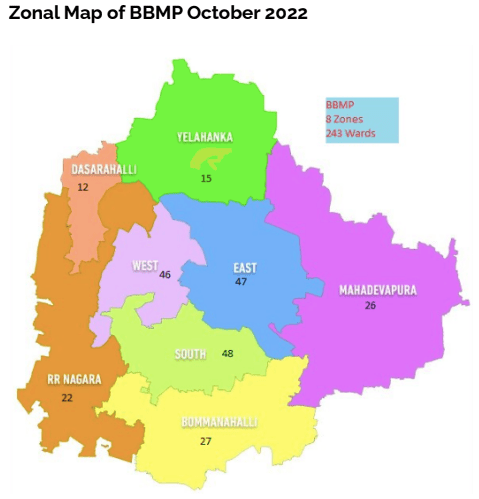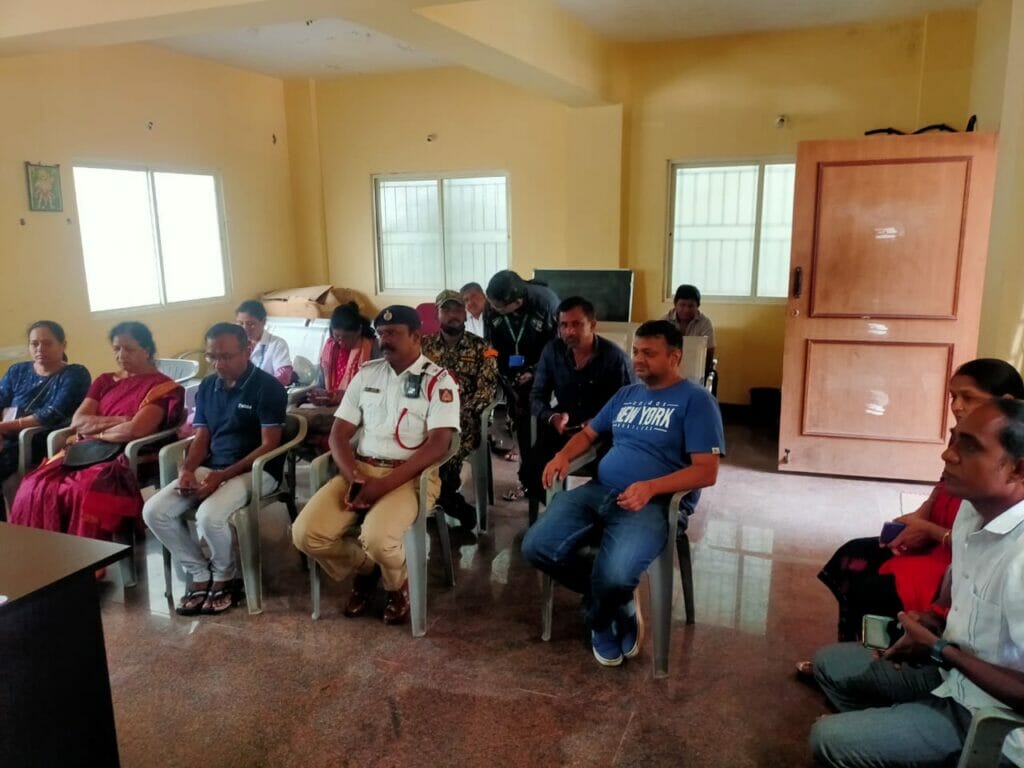A Ward Committee meeting is a unique opportunity for all citizens, regardless of their social or economic status, to sit across the table from officials and participate in ward-level governance.
No other major city in India has Ward Committees as Bengaluru does. This is made possible by the ‘BBMP Act 2020’, which replaced the earlier Karnataka Municipal Corporation Act and provides for ward committees.
Read more: Everything you must know, as Bengaluru marks a milestone in local governance
What is a Ward Committee Meeting?
BBMP, the city Corporation of Bengaluru, is divided into eight zones and 243 wards. Each of us belongs to a ward, a small geographic area with a population of about 40,000-50,000. Each ward is part of a Zone. All of us elect one candidate to represent our ward, called Corporator, once in five years.
Every ward has an Engineer, Health Inspector and Revenue Officer who are responsible for various civic functions in that ward. Apart from BBMP officials, there are Engineers that belong to BESCOM (Electricity) and BWSSB (Water Supply and Sewerage), and Police Officers from both Law and Order and Traffic.
The Ward Committee is the only place where citizens of the ward can meet in person with all the officials who are working in the ward, along with the Corporator, to address local issues, monitor expenses and make plans for the future. This is only possible due to the excellent Law we have in Karnataka that makes sure all government agencies participate in Ward Committees.
Recently, the BMTC announced that they will begin to attend Ward Committee meetings in order to gather public feedback on bus services.

When do Ward Committee meetings happen?
In Bengaluru, Ward Committee meetings are expected to be held on the first Saturday of every month in the Ward Office at 10 am.
During the pandemic, BBMP started holding Ward Committee meetings twice a month, the first and third Saturdays of every month and this tradition still continues, even though the law mandates only one monthly meeting.
The BBMP Council passed a resolution in October 2019 that every ward must convene a Ward Committee meeting on the first Saturday at 10 am in the Ward Office so that there is no confusion on when and where meetings take place.
Do all wards have Ward Committee meetings?
Unfortunately, no. In the absence of elected representatives, i.e Corporators, (BBMP Elections have not been held for two years) BBMP appointed Nodal Officers are to Chair Ward Committee meetings. In some wards, Nodal officers have not been appointed or are not trained, resulting in several wards not holding monthly meetings.
However, since September 2022, BBMP Zonal Commissioners have been very proactive in ensuring all meeting notices are published before the meeting. Nearly 350 meetings happened in September 2022.
Who chairs the Ward Committee meetings?
By law, the Corporator chairs Ward Committee meetings. As an elected representative of all the voters in the ward, the Corporator is the political head of a ward. Note that currently there is no Corporator and the Nodal Officer appointed by BBMP acts as the Chairperson.
Every Ward Committee also has a Ward Secretary. Typically, the Ward Engineer or Health Inspector acts as the Ward Secretary. The role of the Ward Secretary is to issue meeting notices and record meeting minutes and submit minutes to the BBMP Portal for record keeping.
Read more: Why I like Ward Committees so much – and how you can too
Who can attend a Ward Committee meeting?
By law, any resident of the ward can attend the ward committee meeting. No one can stop residents of the ward from participating in their own ward committee.
By law, each Ward Committee has ten citizen members. Since each ward has nearly 50,000 citizens, ten members are expected to represent all the voters from different parts of the ward. The membership is also designed to ensure gender inclusivity with three women members, two representatives from SC/ST and two from RWAs.
However, currently, there are no Ward Committee members as the Council term ended. New Ward Committees will be constituted post-BBMP Elections, to be held by December 31st, as per a recent High Court ruling. Anyone who participates in a Ward Committee meeting is a member of that Ward Committee. If you are stopped from sitting in a Ward Committee meeting, please assert your right to be in the meeting.
Even afterwards, committees get formed formally post-election. All residents are welcome to attend Ward Committee meetings, and they can raise issues with permission from the Chair.

Are Ward Committees inclusive?
Absolutely. Unlike RWAs and Apartment Communities, which typically represent a homogeneous set of people who live in a particular type of housing, Ward Committees are truly representative of the diversity of the ward. The law that guides Ward Committees is extremely progressive in the sense it mandates the participation of women, the SC/ST community, and RWAs.
In a few wards, it has been reported that a few people with vested interests try to dominate the Ward Committee meetings for political or other reasons and try to block citizens from participating and/or speaking up. However, our observation is that when citizens work together as a group, they can assert their rights and make their voices heard.
This does not mean, citizens of all sections of society participate actively in Ward Committees. Many citizens cannot join such meetings as they prioritise livelihood and cannot afford to take time off. It is important that those of us who have the means and passion take the lead to ensure better participation and to represent issues of all areas in the ward.
Do I need to know Kannada to participate in the Ward Committee meeting?
The state’s official language is Kannada and all government proceedings are conducted in Kannada. However, BBMP officials and fellow citizens often help and ensure your voice is heard even if you cannot communicate in Kannada.
We highly recommend learning basic Kannada to get started. There are many online resources and your participation in the Ward Committee is one of the best ways to assimilate into the local culture.
How do I meet other people in my ward?
The ward maps have been completely redrawn, as the number of wards has increased from 198 to 243, after the recent delimitation exercise. Once you understand your new ward boundaries, look at various communities that are part of your ward. Many of them are likely to have Management Committees, RWAs etc and are part of some Civic Groups, Federations etc. Social media, primarily Twitter and to some extent Facebook, can also help you find fellow residents of your ward.
Bengaluru Ward Samiti Balaga is a city-wide forum for all citizens, civic groups, RWAs, and social organisations that want to come together and speak in one voice to strengthen Ward Committees. It is a collective supported by several reputed organisations that are apolitical and focused entirely on the success of Ward Committees. The organisations include Janaagraha, B.PAC, BAF, Whitefield Rising, APSA, Sensing Local, Citizens for Bengaluru, Changemakers of Kanakapura Road, Citizen Participation Program, etc.
The Balaga works with the BBMP to strengthen Ward Committees by providing constructive feedback to the BBMP. The Chief Commissioner recently took several actions based on their recommendations and also participated in the Balaga meeting held in October 2022, which was attended by nearly 70 civic organisations.
Links to join Bengaluru Ward Samiti Balaga WhatsApp groups:
- South WCBalaga-South
- East WCBalaga-East
- West WCBalaga-West
- Mahadevapura WCBalaga – MDP
- RRNagar+Bommanahalli – WCBalaga-RRNBMN
- Dasarahalli and Yelahanka WCBalaga-DSHYNK
For more information on ward committees: click here.
The author recommends learning “basic” Kannada. I am afraid that may not be enough. Even the government’s RTI web-site, while providing a choice to raise queries in English, the replies are invariably in Kannada, and Kuvempu level of Kannada at that. And, all of this while inviting investment from global technology leaders.